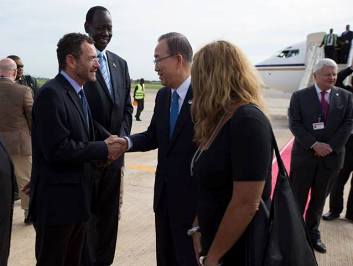International community calls on S. Sudan to put peace deal into action
May 10, 2014 (JUBA) – The international community has cautiously welcomed the signing of a peace deal between South Sudan’s rival leaders aimed attending the almost five-month-old conflict, calling on both sides to translate their commitments by reining in violence on the ground.

President Salva Kiir and former vice-president turned rebel leader Riek Machar signed the agreement on Friday in the Ethiopian capital, Addis Ababa, pledging to end hostilities within 24 hours following face to face talks brokered by the Intergovernmental Authority on Development (IGAD).
“He demands that the parties immediately translate these commitments into action on the ground, in particular the cessation of all hostilities,” said Ban’s spokesperson.
The UN secretary-general has also commended the efforts of IGAD, particularly its chair, Ethiopian prime minister Hailemariam Desalegn, reiterating the UN’s commitment to the people of South Sudan.
The UK has also welcomed the agreement, but said it still had grave concerns over human rights violations and continued fighting in the country.
Minister for Africa Mark Simmonds described the agreement as a “long overdue step”, calling on both parties to ensure unhindered humanitarian access to conflict-affected areas.
“It is essential that both sides ensure its immediate implementation and take full responsibility for the forces under their control,” he said.
“Only with continued engagement and the genuine commitment of both sides will South Sudan be able to pull back from catastrophe,” he added.
Conflict erupted in South Sudan in mid-December last year following escalating political tensions between Kiir and Machar, who was sacked last July.
The conflict has reignited tribal tensions, pitting Kiir’s Dinka tribe against rebel militia from Machar’s Nuer ethnic group.
The UN Mission in South Sudan (UNMISS) has alleged that 200 civilians sheltering in a mosque were massacred in Unity state capital Bentiu after rebel forces retook the town from government forces.
The incident sparked international condemnation, amid warnings the country was at risk of a possible genocide.
Damning reports by UNMISS and Amnesty International documented atrocities on both sides, including indiscriminate killings and gang rape.
Simmonds said the reports reflected the “horrific scale and nature of atrocities that both sides have committed”, warning that “deliberate and persistent targeting of civilians and attacks on individuals because of their ethnicity may constitute crimes against humanity”.
“I call on both the Government of South Sudan and the rebels to acknowledge the gravity of the UN report and respond constructively to its recommendations,” Simmonds said.
“The UK stands ready to provide all necessary assistance to the UN and the African Union Commission of Inquiry as they carry out their investigations, and continues to support the tireless efforts of the Inter-Governmental Authority on Development and its mediators to bring an end to the suffering in South Sudan,” he adds.
Humanitarian agencies say the humanitarian consequences of the conflict would continue to be felt in the longer term regardless of the peace deal.
However, UN humanitarian coordinator for South Sudan Toby Lanzer said the agreement would allow some “breathing space”, in terms of allowing people to return to their land and plant crops.
“The parties’ commitment to end the conflict and to cooperate, unconditionally, with the UN and humanitarian agencies to ensure that aid reaches millions of affected people in all areas of South Sudan is very welcome,” said Lanzer.
He said it was vital that aid agencies were now given full access to affected communities in order to allow the transport of emergency relief.
“NGOs and UN agencies continue to scale up operations to meet the needs of food insecure communities, people displaced by the conflict, and refugees cut off from assistance,” he said.
“Aid agencies are committed to delivering in the most focused, cost-effective and efficient way so that more aid can reach more people in need,” he added.
However, Lanzer has called for the country to establish lasting peace so that people could once again resume their livelihoods and rebuild their communities.
Conflict in the country has killed thousands and displaced more than a million people, with hundreds of thousands seeking shelter at UN compounds in the country and in neighbouring countries.
(ST)
